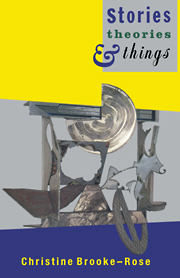Book contents
- Frontmatter
- Contents
- Preface
- Acknowledgements
- Part I Theories as stories
- Part II Stories and style
- 4 A for but: Hawthorne's ‘The Custom-House’
- 5 Ill locutions
- 6 Ill logics of irony
- 7 Ill wit and sick tragedy
- 8 Cheng Ming Chi'I'd
- 9 Notes on the metre of Auden's The Age of Anxiety
- Part III Theories of stories
- Part IV Things?
- References
- Index
9 - Notes on the metre of Auden's The Age of Anxiety
Published online by Cambridge University Press: 20 August 2009
- Frontmatter
- Contents
- Preface
- Acknowledgements
- Part I Theories as stories
- Part II Stories and style
- 4 A for but: Hawthorne's ‘The Custom-House’
- 5 Ill locutions
- 6 Ill logics of irony
- 7 Ill wit and sick tragedy
- 8 Cheng Ming Chi'I'd
- 9 Notes on the metre of Auden's The Age of Anxiety
- Part III Theories of stories
- Part IV Things?
- References
- Index
Summary
Five years have now elapsed since the discovery, in 2192, of the almost unique Old British poem called The Age of Anxiety, by one W. H. Auden. It is being carefully edited, and a description of the volume itself, together with an outline of its contents, has already appeared in Teen-Age Studies (Cass.9, Prog.2, April 2191). In spite of some apparent Americanisms, the dialect is distinctly twentieth-century British, and the poem is in fact dated for us, since it was recovered relatively undamaged in book form, in a Californian cave: it was published in London in 1948. The question of emendation thus does not arise. I propose here to give a preliminary account of its metre.
As readers will know, almost nothing of the apparently copious poetry in the English language survived the two Semi-Nuclear Wars. Some early manuscripts in the Anglo-Saxon tongue were evidently considered precious, for they were hidden in a vault in the Himalayas before the first of these wars, and are thus fortunately extant. There is, however, ample external evidence of a continuous poetic tradition throughout the ten centuries between these early records and the newly discovered Age of Anxiety. We have numerous references to poetry in the little English prose which survived, as well as in foreign literatures (for instance in India and Peru). And there is the famous Bantu translation of a verse-play called Hamlet, though it is difficult to determine from this what the original metre may have been: the laxity of barely discernible rules may be due to the translator.
- Type
- Chapter
- Information
- Stories, Theories and Things , pp. 143 - 154Publisher: Cambridge University PressPrint publication year: 1991

